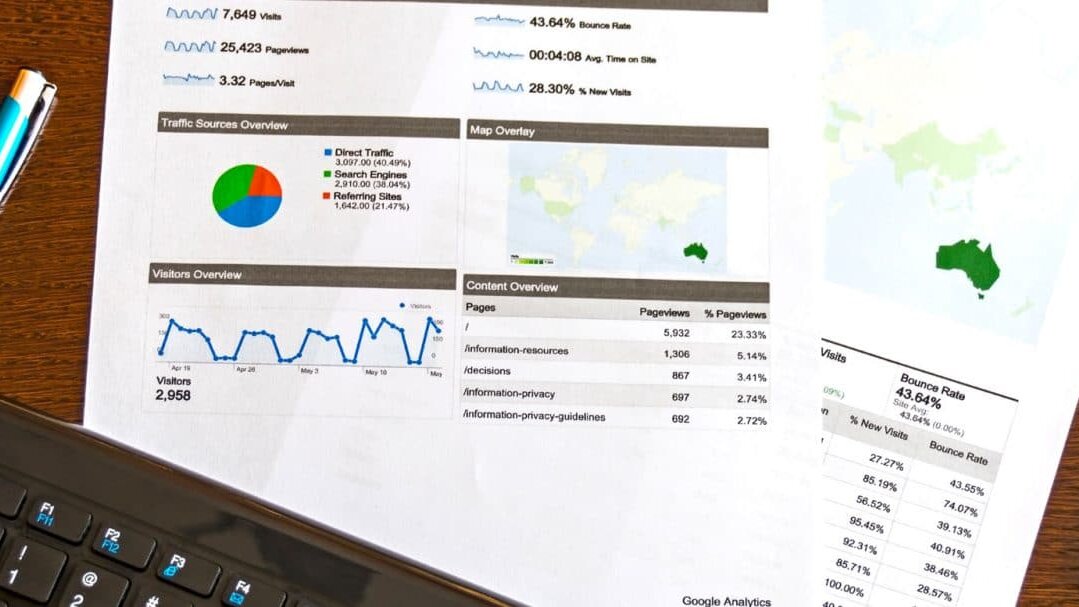Market research is a cornerstone of business strategy because it helps organizations:
- Understand the target audience
- Evaluate the competition
- Make informed decisions
In the past, traditional market research methods involved manual data collection, complete surveys on paper, and statistical analyses in Excel. These research methods were often time-consuming and resource-intensive (money, finance), and, more than that, had a limited capacity to capture the complexities of consumer behavior.
Furthermore, as technological progress has been made, we now have surveys conducted online and much more powerful analytical tools than the data processed in an Excel sheet. Data began to be collected much faster and could be analyzed more accurately and from many more perspectives.
The COVID-19 pandemic and the evolution of artificial intelligence have accelerated the final integration in 2022 of what can make research faster, more comprehensive, and based on the technologies that shape the daily life of the consumer.
Market research is one of the fields where AI has had a significant and extremely beneficial impact.
Algorithms and AI techniques have revolutionized data analysis and interpretation, allowing researchers to gain a deeper perspective on consumer preferences and market dynamics.
By leveraging the power of AI in market research, we can analyze results in a fraction of the time with up to 95% less effort even when dealing with unstructured data — like open-ended responses to any question. This enables companies to make quicker and more precise decisions regarding business or marketing strategies.
Conținut
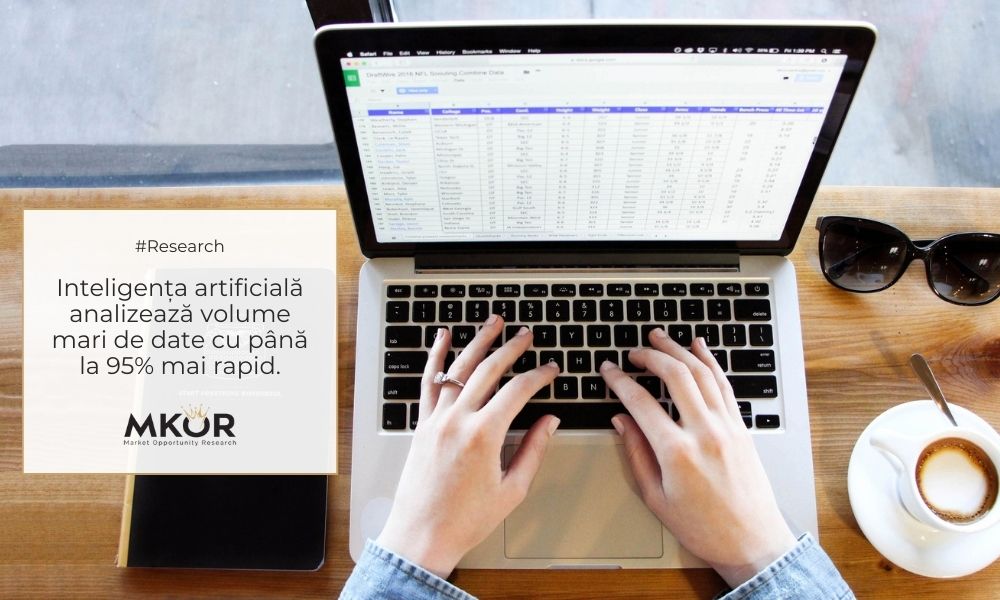
Analysis of Open-Ended Responses with ChatGPT4 in Google Sheets
In a world where data volumes are growing exponentially, facing this avalanche of information can seem like a daunting task. At MKOR, however, we are not discouraged by challenges; instead, we meet them with innovative solutions.
Inspired by the idea of using emerging technologies in research, we have implemented a custom script to utilize ChatGPT4 in Google Sheets. This AI-powered data analysis method has allowed us to process and categorize responses in an efficient and precise manner.
In the context of the market study “The Reality of Romanian Management” conducted by MKOR in partnership with TBF and presented during the Fundamental Event, we analyzed four open-ended questions which garnered 22,141 responses.
While analyzing manually, responses could be divided into relevant categories but it took a lot of time and there was a risk that the analysis might not be entirely objective since we’re talking about open-ended, subjective responses, which are difficult to measure and relate to relevancy. However, utilizing analysis of open-ended responses with the help of business strategies, a task that quantitative market research offering predefined answers would not be able to accomplish.
With ChatGPT4, we managed to categorize all responses and identify trends and patterns within these data.

The analysis spanned a wide array of topics, from organizational goals and workplace responsibilities to performance indicators and the measurable outcomes needed for promotion.
Throughout this process, ChatGPT4 played a crucial role. With the help of artificial intelligence, we were able to reduce the time spent analyzing unstructured data by 95%.
For such a large volume of data, this has a significant impact on the quality of the research conducted and any other research tool would not have achieved this level of efficiency.
The result?
A dataset that was not only categorized and organized but also offered valuable insights and new perspectives.
- We gained a better understanding of the expectations and needs of managers and employees.
- We uncovered essential aspects of how they perceive their own responsibilities.
- We discovered the factors that count most in evaluating employee performance as well as top management.
The open-ended response analysis with ChatGPT4 in Sheets is just a small example of the artificial intelligence application that we’re already implementing with success in qualitative research.
The implementation of AI in our business workflow has allowed us to process a massive quantity of data, in a short time, to produce relevant and applicable results in the daily realities of businesses and organizations.
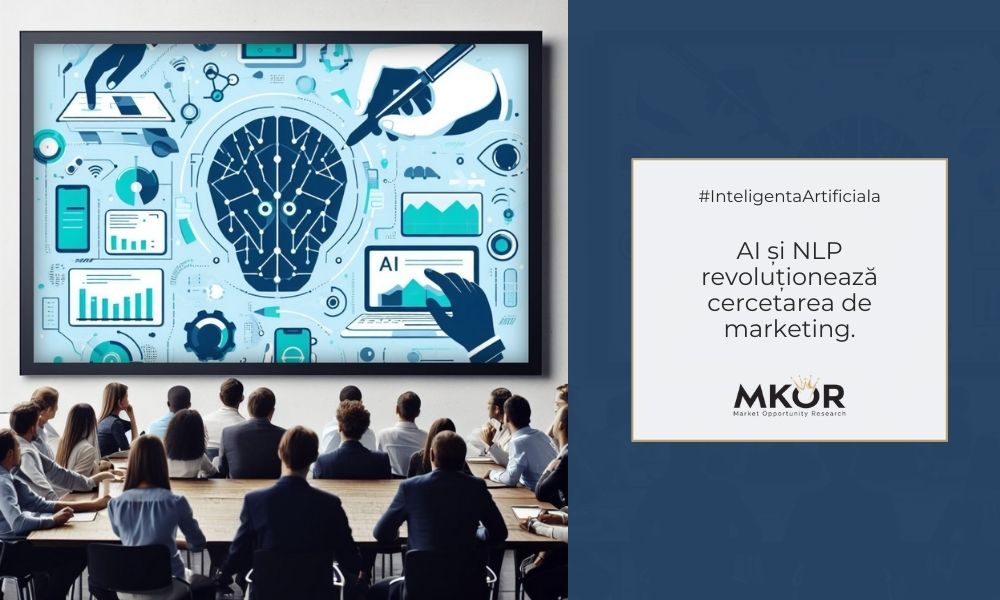
Research Techniques Based on AI: Practical Applications of NLP Algorithms in Marketing Research
Marketing research has experienced a significant evolution by integrating artificial intelligence (AI) and natural language processing (NLP) into its toolkit. AI and NLP have become indispensable tools in marketing research. They are used for a faster and more accurate understanding of consumer perceptions and behaviors.
From sentiment analysis to data extraction and interpretation, AI and NLP can transform a vast amount of textual data into valuable and actionable insights. As a result, companies can gain deeper insights into their audience and can develop more effective business strategies.
AI can be used for automatic categorization of open-ended responses, saving time and resources and potentially increasing the accuracy of research results by minimizing human errors.
In this way, AI can reveal key aspects hidden in raw data, contributing to the discovery of new opportunities or the identification of unmet challenges.
NLP also plays a crucial role in research. It helps transform textual data into a structured form that can be more easily analyzed.
With the help of NLP, we can better understand the tone and sentiment behind consumer open-ended responses and identify unexpressed needs.
AI and NLP represent the future of marketing research.
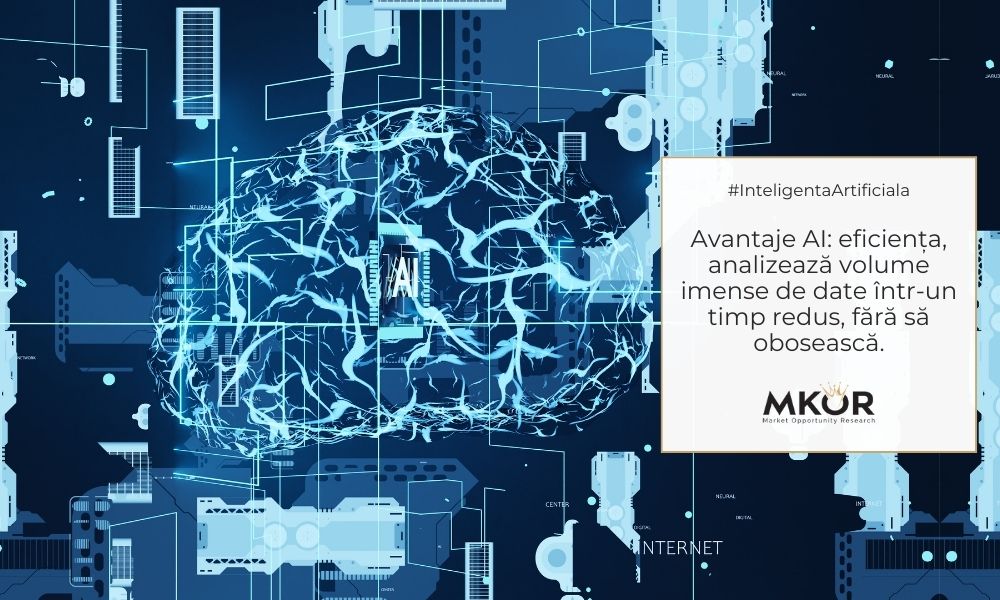
Automating Data Analysis with AI: Enhancing the Efficiency of Market Research
In the dynamic world of business, efficiency is not just desired, it’s essential. And when it comes to market research, this need is critical. At MKOR, we utilize AI automation and believe it’s the key to obtaining quick and accurate results.
When we analyzed the 22,141 open-ended responses in the TBF study on the Realities of Romanian Management, we saw firsthand the power of AI.
By using artificial intelligence data analysis methods, we were able to process, analyze, and interpret data in record time. One of the major advantages of using AI in marketing research is its ability to analyze Big Data.
Having a massive volume of data available to us now, being able to process it quickly and efficiently is a true blessing. AI allows us to do exactly that. An AI’s precision is invaluable. It does not become outdated, nor does it lose focus and is not prone to human error.
This means that the results we obtain are more precise and more reliable than those obtained through traditional methods. Although we recommend always verifying the information generated by AI with a human touch.
Moreover, AI allows us to make very precise predictions. With the help of Machine Learning, AI can learn from past data to predict the course of future events. This improvement in our efficiency, in turn, enhances our results.
The Impact of AI on Qualitative Market Research: Increasing the Accuracy of Results Through AI Technology
At MKOR, we continuously strive to obtain the most precise and accurate research results possible. Here, artificial intelligence (AI) plays a vital role in enhancing the accuracy of marketing research.
When dealing with 22,141 open-ended responses, human errors are almost inevitable. Whether it’s an error in data entry, misinterpretation of a response’s tone, or subjective interpretation of answers, these can introduce errors in the data and, implicitly, in our understanding of consumer behavior.
Furthermore, AI can identify patterns and trends that humans may overlook. Let’s not forget that AI can process immense volumes of data much more rapidly and efficiently than any team of analysts. This means that it can collect and analyze much more data, thereby increasing the precision and accuracy of our studies.
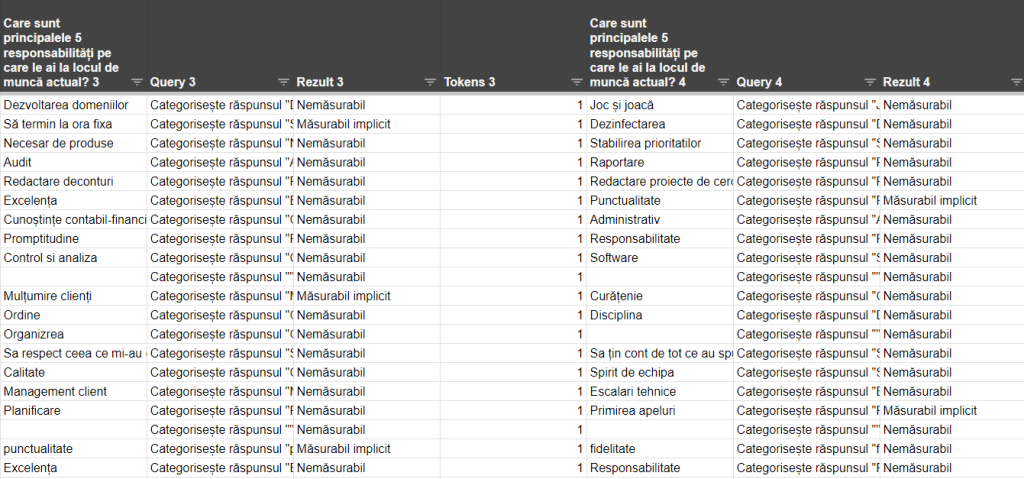
AI also enhances the reliability of research. AI algorithms can be trained to recognize and exclude erroneous responses, identify and correct errors, and ensure that all data is analyzed in an equitable and objective manner.
However, we don’t rely solely on technology. We use AI as an additional tool, not as a replacement for human analysts. We remain the ones who interpret the results and transform them into efficient marketing strategies. AI simply helps us work faster and more accurately.
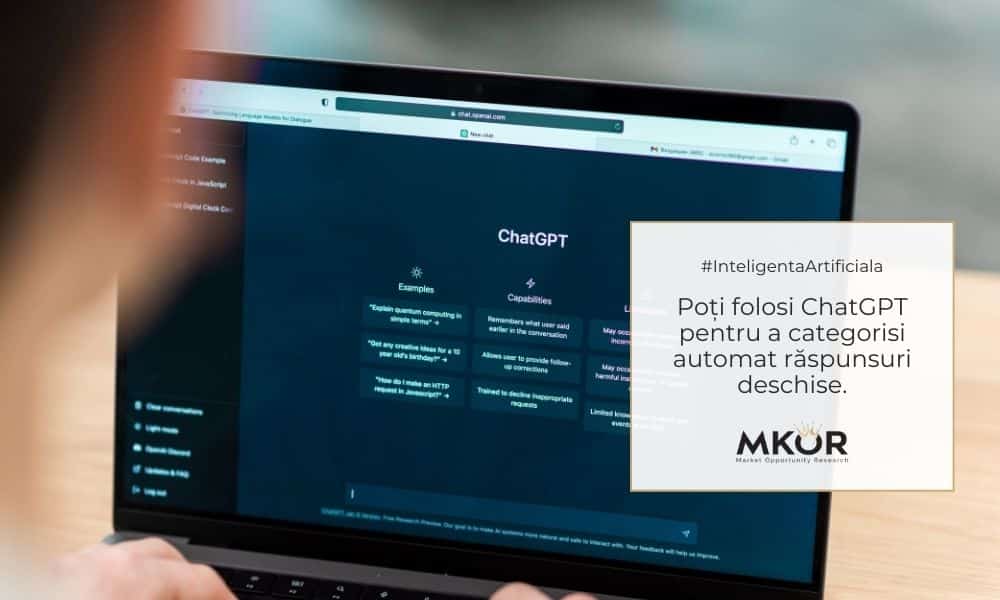
AI Solutions for Data Processing: Automated Categorization of Open-Ended Responses
At MKOR, we’ve transformed a mountain of data into actionable information with the help of automated data categorization by AI. Anyone involved in marketing research knows how easy it is to get overwhelmed by a flood of open-ended responses and how to organize them into useful and significant categories. Well, we’ve decided to take it to the next level.
Through the application of artificial intelligence in research, we’ve discovered that we can automatically categorize data. AI algorithms, as well as ChatGPT, can sift through thousands of responses, identifying themes and relevant subjects.
For instance, in a study that surveys consumers about their shopping preferences, responses that mention concepts like “promotions,” “discounts,” or “savings” can be classified into a general category of “price sensitivity.”
Other responses that highlight aspects related to “quality,” “durability,” or “trust” can be grouped separately into a category oriented toward “quality focus.”
Thus, the algorithm for automatic categorization can quickly identify consumer profiles based on the semantic analysis of the text in responses. This type of nuanced understanding is extremely difficult for a time-pressed consumer to realize.

AI: Unveiling Hidden Aspects in Open-Ended Responses
Let’s engage in a thought exercise: imagine standing before a vast landscape and having a pair of binoculars with the power to make all the subtle details, even the hidden ones, visible at first glance. What could you do with such a magic binocular? Wouldn’t you use it?
Well, in the world of marketing research, this binocular is undeniably artificial intelligence.
In a domain where words can be as valuable as numbers, AI helps us to unveil the underlying messages in open-ended responses.
At MKOR, we haven’t just used our technological binoculars for analyzing open responses. By employing data analysis methods powered by artificial intelligence, we’ve deciphered models and meanings within responses that manual analysis could have missed. This approach not only saved us time but also brought to light the subtle nuances of opinions, behaviors, and preferences of our consumers.
MKOR has implemented GPT4, and with it, we’ve successfully detected tones, contexts, and even sarcasm, helping us to better understand attitudes and sentiments of the population.
Furthermore, AI use for analyzing open responses allows us to examine data from a variety of perspectives. For instance, we can segment data based on demographics, consumer behavior, or any criterion we’ve deemed significant for our research.
This ability to divide and categorize data helps us to reach a deep level of understanding of the entire population both in the workplace and beyond.

Steps for Building Predictive Models Based on Artificial Intelligence
In an era where change is rapid, the predictability and capacity to anticipate future trends become invaluable assets.
In this digital age, artificial intelligence (AI) and predictive analysis working together create an unparalleled duo, capable of foresight that can help anticipate the future.
At MKOR, we’ve transformed artificial intelligence into a tangible asset through practical and efficient approaches to predictive analysis. The goal was not only to dissect the 22,141 open-ended responses but to discern underlying trends and glean intelligent insights for business decisions.
The process of constructing predictive models with artificial intelligence involves several key steps:
Firstly, the raw data undergoes a preprocessing phase – a necessary procedure to prepare and cleanse data elements for analysis. This includes addressing any language errors, normalizing text, and reducing variables that do not contribute to predictive accuracy (like stop words). Subsequently, the text is transformed into vectors embedded with semantic significance. We can employ topic modeling techniques to further extract subtopics, with LDA (Latent Dirichlet Allocation) being a go-to probabilistic generative model.
Based on these patterns, we utilize robust machine learning algorithms to foresee trends. This could involve logistic regression, neural networks, or decision trees. Models draw insights from characteristics and variables of interest (e.g., customer satisfaction levels).
Once trained, these models apply their AI intelligence to new text examples to predict categories or outcomes. For instance, the model may predict the probability that a customer sentiment is positive based on feedback content.
Maintaining ongoing accuracy in predictions, pattern recognition, and model outcomes is crucial for continuous improvement. Therefore, the models developed through artificial intelligence must be adapted to new information.
The construction process of predictive models allows us to extract significant patterns from data, revealing hidden gems that can offer new insights into consumer behaviors and anticipatory actions for the future.
This intelligent process is a powerful ally for understanding the present and, more importantly, for shaping the future.
Interpreting Data Through Artificial Intelligence: Uncovering Unexpressed Needs of Respondents Through AI Analysis of Open Responses
What if you could read the thoughts of your respondents? Well, with artificial intelligence data interpretation, we are practically there. At MKOR, we use GPT in analyzing open responses and uncover fascinating insights. More importantly, we discover the unexpressed needs of our respondents.
It is not enough to know what our respondents want now. It is crucial to understand what they will need in the future, even if they are not aware of it yet. And this is where the magic of AI data interpretation comes in, which allows us to uncover the unexpressed needs of the respondents.
Using AI in qualitative research completely transforms this process. Instruments like AI for data analysis have the ability to identify and interpret the subtleties in open responses. This is akin to a higher level of analysis, which involves interpreting meanings and sentiments, not just words.
An example of such interpretation might be identifying frustrations or unspoken wishes of the respondents. With AI, we can use methods like integrating ChatGPT to discover patterns in open responses. This allows us to understand what truly drives the respondents and how clients might improve their products and services to address correct market needs.
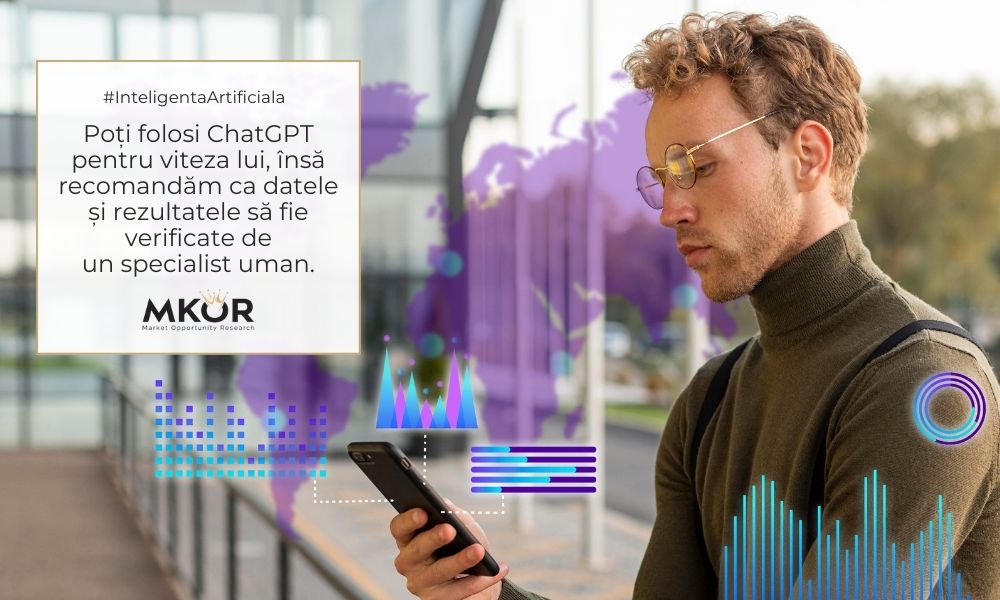
Ethical Aspects of AI Use in Marketing Research
Artificial intelligence (AI) has profoundly changed how we conduct marketing research, offering powerful tools for data analysis. With this power comes a great responsibility.
At MKOR, we take the ethical use of AI in achieving research goals very seriously. A central aspect of market research ethics at MKOR is the respect for respondent privacy and confidentiality.
When we categorized open-ended responses with GPT4, we treated each response with the highest level of confidentiality. The information was anonymized and used solely for research purposes, and AI data analysis was conducted in a secure and protected environment.
Moreover, AI surpasses human bias, offering valuable insights that must be carefully interpreted. We cannot rely solely on algorithms to make all decisions; human oversight is necessary to ensure results are interpreted correctly and equitably.
Transparency is also crucial. It’s essential for us to be open about how we use AI in research. This includes explaining our data analysis methods and ensuring the results are presented in a way that doesn’t infringe on individual privacy.
Another important aspect we consider is the continuous updating of our team’s knowledge and skills regarding the latest developments in the field of emerging research technologies like Machine Learning and Deep Learning, not only for efficacy but also for ethical practice. At MKOR, we commit to staying abreast of these evolutions to adapt our ethical practice in connection.
The ethics of AI in marketing research is not a secondary or optional issue. Ethical considerations are fundamental to our work at MKOR and are integrated into every aspect of our work process.
We respect the autonomy and privacy of our respondents and we implement artificial intelligence in our research without compromising the research integrity, always aligning with our ethical principles. ✅
AI and Marketing Research: Where Are We Heading?
From our perspective, leveraging artificial intelligence to better understand research data can open a new horizon of possibilities for any organization.
As experts in market research and automation techniques for growth marketing, we consider this approach not only streamlines processes but also brings valuable information that can significantly improve strategies and help achieve business growth objectives.
At MKOR, we are dedicated to bringing the benefits of this approach to our clients. We believe in the power of artificial intelligence to transform raw data into actionable ideas and concrete actions. In this sense, we offer personalized solutions for data analysis, to help you better understand your clients, the market, and your own business.
We invite you to discover more about the services of MKOR Agency, where you can request a personalized offer tailored to your business needs.
Additionally, we encourage you to subscribe to the MKOR marketing newsletter to stay updated with the latest discoveries and trends in the market, and to understand how AI can transform market research for a better understanding of your business environment.
Have you read everything? Comment / join our newsletter / read our other research posts!
2024 Professional Guide to Market Research: Learn, Plan, and Succeed in Marketing (part 3/3)
January 29, 2024
0 Comments24 Minutes
2024 Professional Guide to Market Research: Learn, Plan, and Succeed in Marketing (part 1/3)
January 29, 2024
0 Comments32 Minutes
The Impact of Utilizing AI (Artificial Intelligence) in Marketing Research
April 23, 2024
0 Comments24 Minutes




